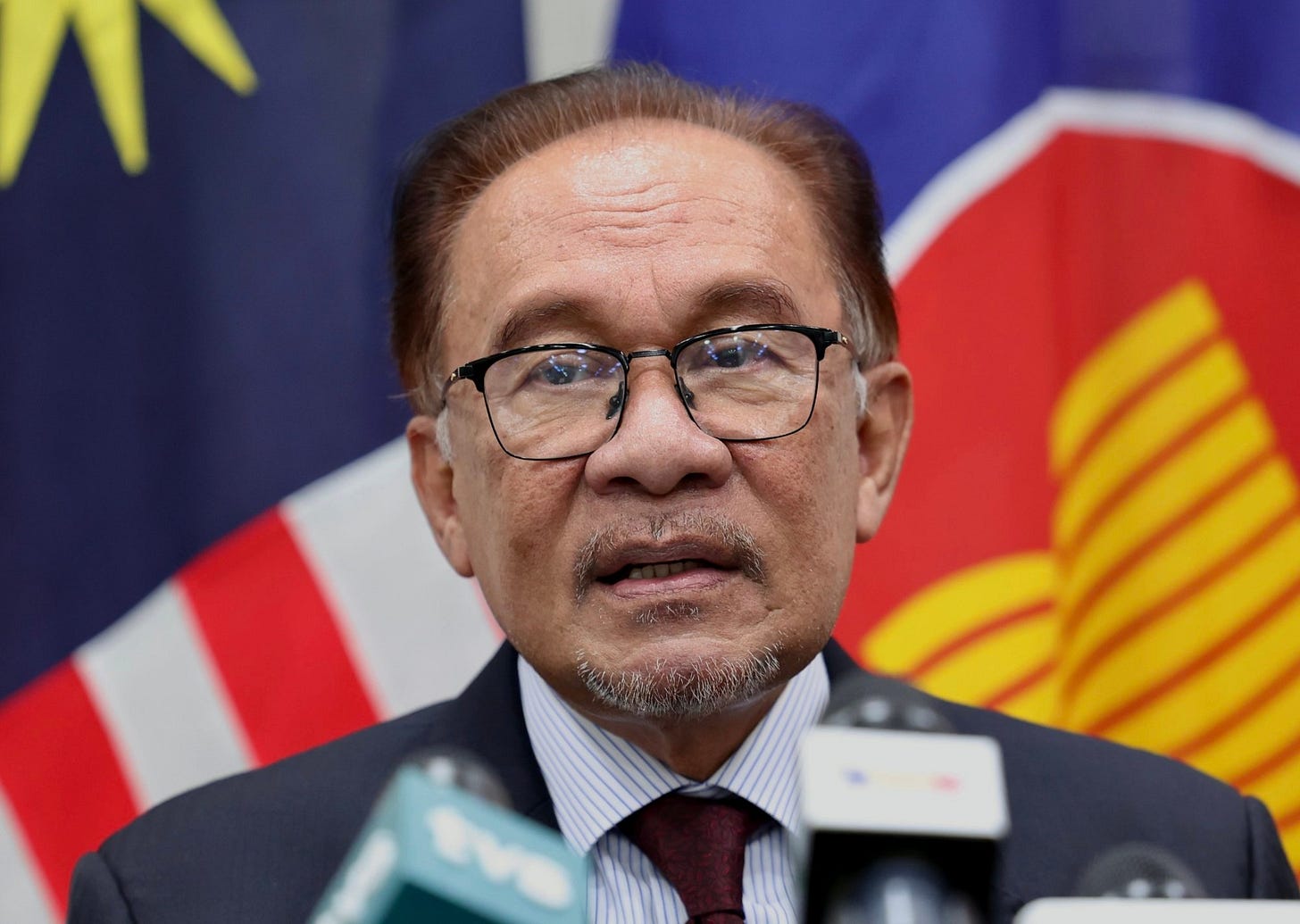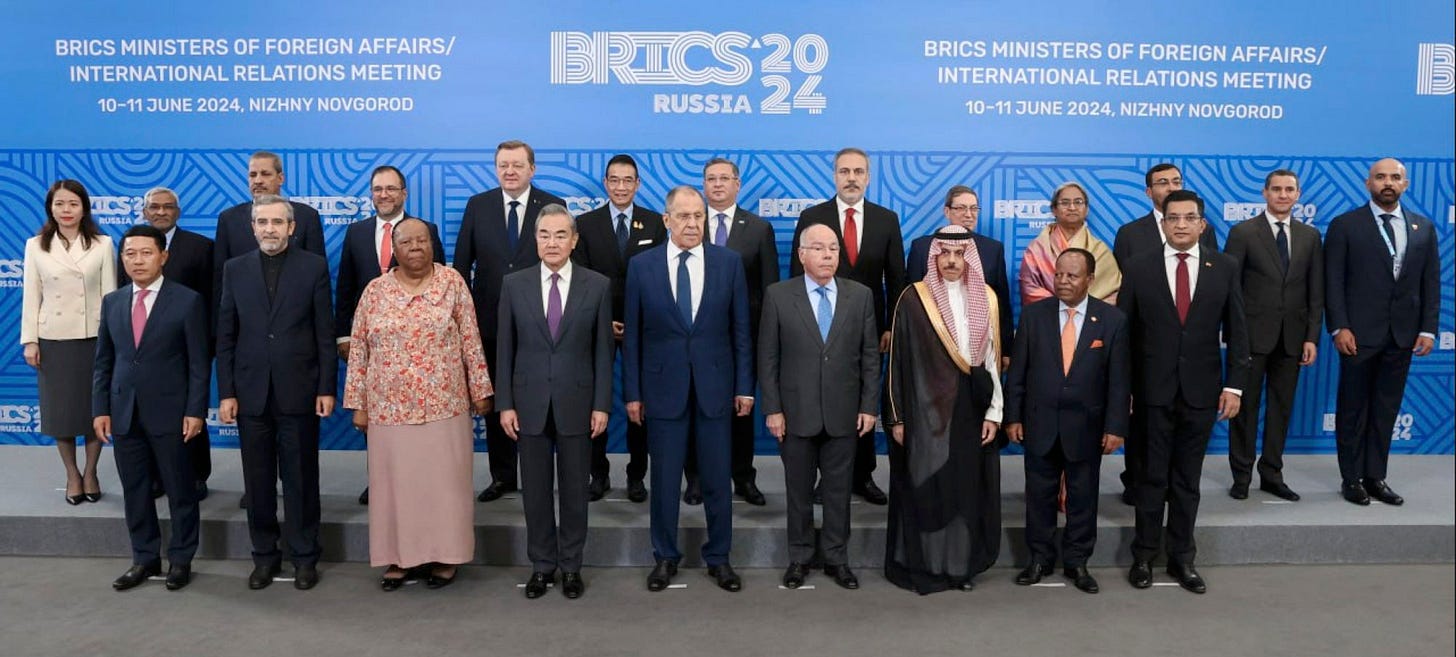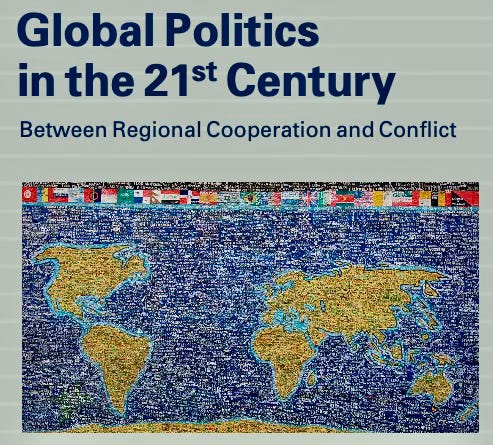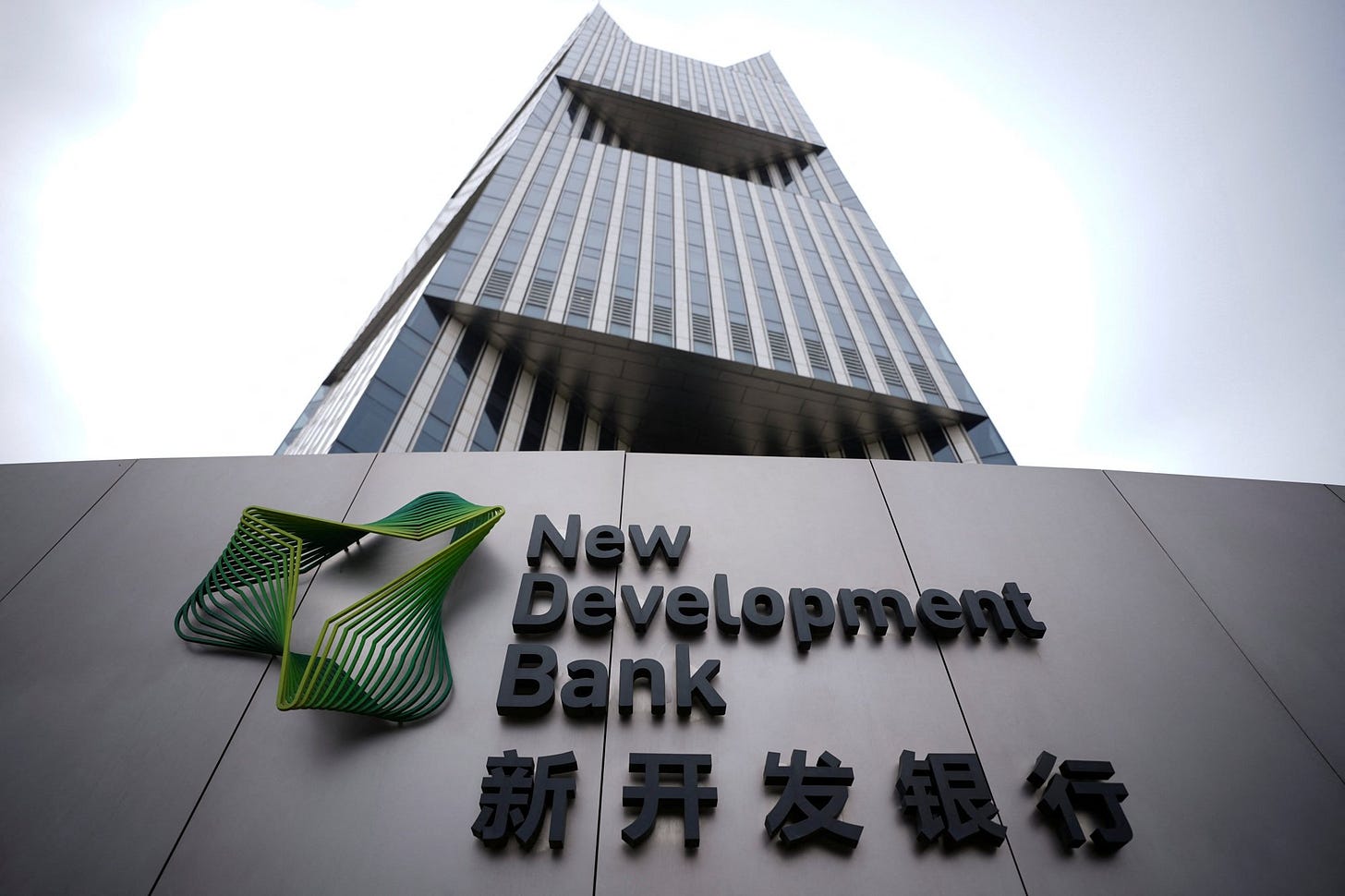BRICS+ ASEAN
Southeast Asia has its reasons for pivoting to BRICS+. ASEAN countries are lured by access to financing and a political movement independent of Washington’s influence.
Southeast Asia pivots to BRICS+
By William Pesek (The Asia Times)
Thailand becomes the first Southeast Asian country to apply for BRICS, that shocks U.S.
Yes, Southeast Asia has its reasons for pivoting to BRICS. ASEAN countries are lured by access to financing and a political movement independent of Washington’s influence, writes ‘The Asia Times’.
In recent days, Malaysia detailed its ambitions to join Brazil, Russia, India, China and South Africa. Thailand and Vietnam are also among the Association of Southeast Asian Nations members expressing similar interest.
In Indonesia, there’s growing awareness that “Global South” nations have a point in vying to join this burgeoning intergovernmental organization.
During an interview with Chinese media ahead of Li Qiang’s visit to Malaysia, Prime Minister Anwar Ibrahim declared his intention to join the bloc after it doubled in size over the last year. That dynamic is luring Global South nations — partly by offering access to financing but also by offering a political movement independent of Washington’s influence.
The Southeast Asia wrinkle could prove particularly problematic for US President Joe Biden. A hallmark of the Biden era since 2021 has been creating a regional bulwark against China’s rising influence and efforts to replace the US dollar in trade and finance.
What we’re seeing is a clear rupture in relations between the US and many ASEAN members. This, at a time when Saudi Arabia is looking to phase out the “petrodollar.” Riyadh is intensifying de-dollarization efforts as China, Russia and Iran line up against old alliances.
“A gradual democratization of the global financial landscape may be underway, giving way to a world in which more local currencies can be used for international transactions,” says analyst Hung Tran at the Atlantic Council’s Geoeconomics Center. “In such a world, the dollar would remain prominent but without its outsized clout, complemented by currencies such as the Chinese renminbi, the euro and the Japanese yen in a way that’s commensurate with the international footprint of their economies.”
In late May, Thailand announced it’s applying for BRICS inclusion in part to boost its presence on the world stage. If approved, Bangkok would likely become the first ASEAN economy added.
“Thailand views that BRICS has an important role to play in strengthening the multilateral system and economic cooperation between countries in the Global South, which aligns with our national interests,” notes Foreign Ministry spokesperson Nikorndej Balankura. “As for economic and political benefits, joining BRICS would reinforce Thailand’s role on the global stage, and strengthen its international cooperation with emerging economies, especially in trade, investment and food and energy security.”
Soumya Bhowmick, an associate fellow at the Observer Research Foundation think tank, says Thailand’s bid supports Beijing’s broader strategic goals of expanding Chinese economic influence in Southeast Asia.
Today, BRICS+ nations account for half the world’s population and two-fifths of trade, including top energy producers and importers. BRICS+ nations also account for 38% of global petroleum imports, led by China and India.
“As more big emerging markets join the BRICS+ nations, the grouping could give the Global South a greater voice in world affairs and challenge the domination of existing institutions,” says Daniel Azevedo, an analyst at Boston Consulting Group.
BRICS+, Azevedo adds, “creates a forum that, at minimum, gives emerging markets the opportunity to align on global topics and new opportunities to promote mutual economic development and growth. And it’s evolving steadily.”
Azevedo notes that as the BRICS build political and financial institutions and a payment mechanism for executing transactions, “there are important potential implications for the future of energy trade, international finance, global supply chains, monetary policy and technological research.”
As a result, Azevedo says, “global companies will need to factor these new geopolitical and economic realities into their investment strategies. They should also strengthen their capacity to capture the opportunities and to mitigate risk that they engender.”
Vietnam sent a delegation to Russia to attend the BRICS summit. There, Deputy Minister of Foreign Affairs Nguyen Minh Hang said Hanoi is keen on collaborating with like-minded developing countries.
All this against the backdrop of deteriorating American finances – and at a moment of maximum political dysfunction. As the national debt approaches US$35 trillion – on the way to US$50 trillion – Biden’s Democrats and Donald Trump’s Republicans are barely on speaking terms.
The question now is how Moody’s Investors Service, which still grades Washington AAA, responds to election-year chaos as Trump angles for a return to power. And as Biden tries to out-Trump Trump with new trade sanctions.
This puts US Treasury securities at grave risk. Japan and China alone hold a combined US$2 trillion of US government debt. Any sudden run on the dollar could trigger a fire sale, sending US yields skyrocketing.
Such concerns are playing into the broader BRICS goal of pooling more than US$100 billion of foreign currency to act as a financial shock absorber. The funds can be tapped in emergencies, allowing members to avoid going to the International Monetary Fund. Since 2015, the bank that the BRICS created has approved tens of billions of dollars of loans for infrastructure, transportation and water.
The BRICS currency project has been gaining traction since mid-2022, when the 14th BRICS Summit was held in Beijing. There, Russian President Vladimir Putin said the BRICS were cooking up a “new global reserve currency” and were open to expanding its usage more widely. Brazil’s Lula also has thrown his support behind a BRICS monetary unit.
Analysts at Moody’s warn that the Americans going overboard on tariffs, concerns about default and weakening institutions are threatening the dollar’s reserve currency status.
“The greatest near-term danger to the dollar’s position stems from the risk of confidence-sapping policy mistakes by the US authorities themselves, like a US default on its debt for example,” Moody’s argues. “Weakening institutions and a political pivot to protectionism threaten the dollar’s global role.”
Now, as Southeast Asia leans toward the BRICS, it’s hard not to think that America risks losing far more than just the economic plot.
Read more here.

BRICS+ lures Malaysia and Thailand as ‘world order crumbles’
By Maria Snow (SCMP - amended)
The prospect of Southeast Asian nations joining BRICS+ has ignited fierce debate among analysts, with proponents arguing membership could unlock lucrative trade and geopolitical opportunities – while sceptics warn it risks dragging countries into Chinaand Russia’s orbit and further eroding regional unity.
Malaysian Prime Minister Anwar Ibrahim set tongues wagging with the revelation earlier in June that his country was preparing to join BRICS+, with formal procedures to begin soon. Thailand has also reportedly submitted a formal request to join, following in the footsteps of Laos and Myanmar, which declared their interest last year.
The Brics group originally comprised Brazil, Russia, India, China, and South Africa, giving it the acronym. Its ranks expanded earlier this year when Saudi Arabia, Iran, Ethiopia, Egypt and the United Arab Emirates also became members.
Malaysia’s push to join Brics has largely been driven by Anwar’s broader rhetoric around championing the Global South and challenging perceived Western double standards, according to regional foreign policy experts.
The Malaysian prime minister has been vocal on issues that align with the overall Brics ethos, ranging from the need for multipolarity to diversified economic development, said Thomas Daniel, a senior fellow specialising in foreign policy and security studies at the Institute of Strategic and International Studies in Malaysia.
“Malaysia looks at Brics not as an alternative but as another complementary multilateral mechanism”, Daniel said, noting that the country already has significant ties with major Brics members China and India. Deepening trade and investment links with other founding members like Brazil could also benefit its trade-dependent economy.
In a recent Facebook post, Anwar called for championing “the rise of the Global South” and fostering a world where “every nation has a seat at the table and a voice in shaping a collective future” – sentiments that dovetail with Bric’s positioning as an alternative to Western-led institutions.
Malaysia’s move also comes amid its growing frustration with the Western-led international community’s perceived double standards on issues like the Israeli-Gaza conflict. Since the escalation of the war, Malaysia has repeatedly expressed concerns about the loss of lives and questioned what it sees as unequal treatment.
Contrary to concerns that BRICS+ membership could erode ASEAN unity and centrality, Daniel said he believes the 10-member Association of Southeast Asian Nations has the flexibility and resilience to maintain its importance for member states.
Many Asean members also belong to other organisations such as the Organisation of Islamic Cooperation, Indian Ocean Rim Association, and the Asia-Pacific Economic Cooperation forum.
“Membership of these organisations did not diminish the importance of Asean for its members and neither would Brics,” he said. “To imply otherwise is to reduce the agency, flexibility and resilience” of Asean.
Other multilateral institutions to which Asean members already belong include the Asian Development Bank, World Bank, International Monetary Fund and Asian Infrastructure Investment Bank.
“Membership of Brics will bring access to a new source of funding for the many developmental needs of the countries of the Southeast Asian region,” said Jayant Menon, a senior fellow at the Singapore-based ISEAS-Yusof Ishak Institute, referring to the New Development Bank that was established in 2015 by Brics countries.
‘A strategic move’
Indonesia and Vietnam have also both said they’re looking into the benefits of Brics membership.
Ayu Anastasya Rachman, head of the international relations department at Universitas Bina Mandiri in Indonesia’s Gorontalo province, said joining such a consortium of major emerging economies could provide better access to lucrative markets, increased foreign investment, and opportunities for collaborative infrastructure projects.
“Joining Brics can also be seen as a strategic move to diversify economic partnerships and reduce dependence on Western-led financial institutions,” she said, adding that Brics membership could ultimately strengthen Southeast Asia’s voice and influence in global affairs, if managed effectively.
Indonesia’s potential BRICS accession is under greater scrutiny, however, due to the country’s status as Southeast Asia’s largest economy and its leadership role within ASEAN, Ayu said, emphasising that Jakarta must carefully balance the advantages of BRICS membership against concerns about over reliance on another economic bloc.
China, as the driving force behind BRICS expansion, aims to make the grouping more representative of the developing world and amplify its collective voice on the global stage.
Many in Indonesia have advocated for the country to join the Organisation for Economic Cooperation and Development rather than Brics so as not “to be seen as aligning too closely to China”, according to Sharon Seah, coordinator of the ISEAS-Yusof Ishak Institute’s Asean Studies Centre.
With Indonesia poised to become the world’s fourth-largest economy, engaging more with developed OECD economies may bring more benefits, she said.
“It is not clear what the comparative advantage of the Indonesian economy is when compared to other large developing economies” such as those in BRICS, she said.
Indonesia aims to join the OECD within three years, as reaffirmed by the country’s coordinating economic minister in May following a visit to Indonesia by the organisation’s secretary general, who met President Joko Widodo.
The OECD projects Indonesia’s gross domestic product will reach US$10.5 trillion by 2050, making it one of the largest economies alongside China, the US and India.
Asean member states opting to also join Brics could become a divisive issue for the regional bloc, according to Thitinan Pongsudhirak, a professor of political science and international relations at Thailand’s Chulalongkorn University.
“Asean centrality will be further eroded”, he said, referring to the bloc’s core tenet of positioning itself as the primary platform in Southeast Asia for addressing regional challenges and engaging with external powers.

The professor also criticised Thailand’s potential Brics membership as “misguided” and a liability for the country’s international standing and credibility. Brics has evolved from a primarily geoeconomic platform for emerging economies to a geopolitical projection in the intensifying conflict between “the West” and “the Rest”, he said.
Seah argued that Brics membership offered Southeast Asian nations a way to “hedge” against the US-China rivalry. “Given that the multilateral order is crumbling all around us,” she said, “is it any wonder that countries are looking for new forms of cooperation?”
The Asean Economic Community Blueprint 2025, which aims to spur greater economic integration among member states, envisions building a highly cohesive, competitive, and innovative regional economy that is deeply connected.
But even enhanced cooperation between developing countries wouldn’t be enough to overcome global supply chain disruptions, Seah said, calling it unrealistic for the Global South to dominate entire supply chains.s.
“The nature of a globalised economy means that different component parts are produced in different parts of the world leveraging the different technologies and resources,” Seah told This Week in Asia.
She said Southeast Asian nations’ desire to join Brics should spur Asean to deepen its own regional integration, which has slowed due to changing geopolitics and rising protectionism.
Ultimately, the crumbing international order “should give Asean greater impetus to integrate more fully,” Seah said. “So that its members need not look outwards”.
Read more here.







